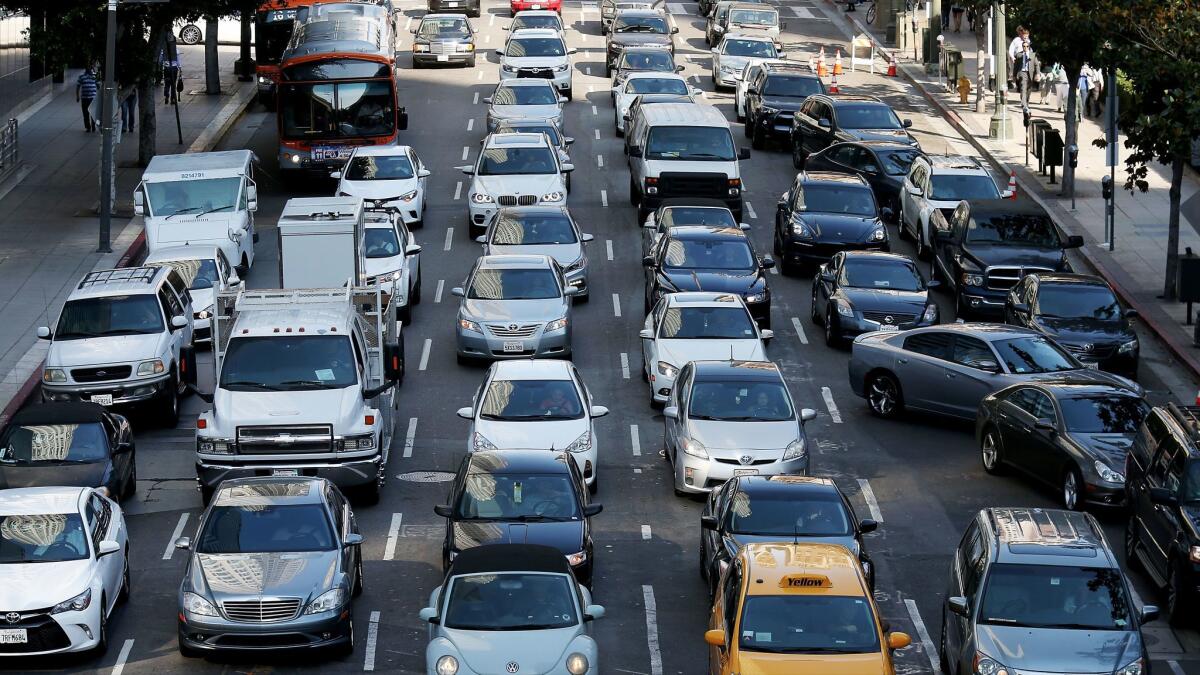Op-Ed: How to fix L.A.’s failed parking policies

- Share via
For more than five decades, local leaders throughout Los Angeles County have been trying to manage parking by managing development. They have failed at both.
Fourteen percent of L.A. County — over 200 square miles — is now dedicated to parking. In fact, 40% more land is reserved for parking than for the entire roadway system in L.A. Yet few Angelenos would say it’s easy to find a parking space, let alone drive through the metro area. Our emphasis on accommodating the car at all costs has backfired. Not only have parking policies failed to improve mobility, they’ve made housing less affordable and hurt the environment.
The excessive parking requirements imposed on builders and businesses have artificially inflated housing prices and rents: a single parking spot adds 12.5% to the price of a housing unit, and two spots add 25%. It’s of course low-income residents who feel the marginal price increases most severely, and many of them don’t even own a vehicle.
What have we received in exchange for these price increases? The region now has 18.6 million spaces for 3.5 million housing units, or 3.3 spaces per vehicle. Even in areas that are considered the most parking-challenged — think Westwood or Hollywood — off-street spaces remain vacant even as curbsides fill up. There’s a mismatch between the parking we have and the parking we need.
One study of a 15-block area in downtown L.A. revealed that people ‘cruising’ for scarce parking cumulatively drive an extra 3,600 miles per day.
Simultaneously, poor management of existing public parking has worsened access to many neighborhoods and damaged the environment with more traffic and air pollution. One study of a 15-block area in downtown L.A. revealed that people “cruising” for scarce parking cumulatively drive an extra 3,600 miles per day. A similar study of a comparable section of New York City found that cruising generates 325 tons of greenhouse gas emissions per year. Meanwhile, L.A. is losing revenue that could be collected through more efficient parking management — funds that could go toward improving sidewalks, bike lanes and transit stops.
Local leaders should prioritize urgent reform of L.A.’s parking policies, particularly in transit-oriented neighborhoods, with the following measures:
- Eliminate or reduce parking requirements for any new development projects.
- Ensure that revenue from parking benefits the local community.
- Rather than mandate new parking requirements in the zoning code, promote shared parking and alternative transportation options.
Policies like these have faced opposition in the past, mainly from stakeholders who worry that such measures would worsen traffic and competition for parking. At the same time, local planners lack comprehensive data about their actual parking demands and are therefore unable to adequately plan for them. To help address these challenges, local leaders should consider:
- Reframing parking reform as an effort to improve mobility and access.
- Gathering comprehensive parking data and making it available to the public and policymakers.
- Creating reliable funding for affordable housing so advocates feel less pressure to use parking requirements as leverage to extract concessions from developers.
There are immediate opportunities to apply better parking policies throughout L.A. County: the ongoing planning of downtown Santa Monica, the comprehensive revision of L.A.’s zoning code, the updating of various community plans and the implementation of Measure M, among other projects. If policymakers don’t follow through, they will risk continuing the failed strategies that created these problems in the first place.
Ethan N. Elkind researches environmental law at the UC Berkeley and UCLA Schools of Law. Mott Smith is a director of the nonprofit Council of Infill Builders, which just released a new report, “Wasted Spaces: Options to Reform Parking Policy in Los Angeles.”
Follow the Opinion section on Twitter @latimesopinion or Facebook
MORE LIVABLE CITY
Plastic pollution doesn’t just make for an ugly beach day. It’s contaminating our food chain
Refilling Silver Lake Reservoir is inexcusably wasteful. Better to live with an empty pit
Meet the architectural menace threatening to ruin downtown L.A.’s rebirth
More to Read
A cure for the common opinion
Get thought-provoking perspectives with our weekly newsletter.
You may occasionally receive promotional content from the Los Angeles Times.










